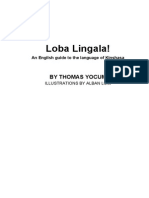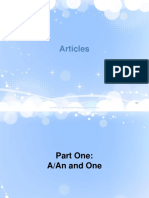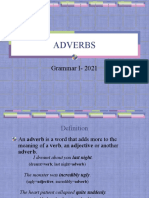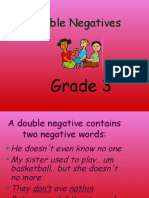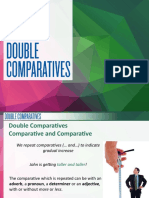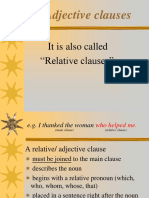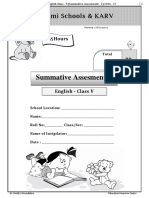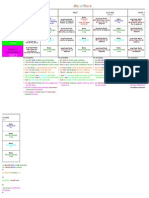Adjective Clauses
Adjective Clauses
Uploaded by
Allan BCopyright:
Available Formats
Adjective Clauses
Adjective Clauses
Uploaded by
Allan BOriginal Description:
Copyright
Available Formats
Share this document
Did you find this document useful?
Is this content inappropriate?
Copyright:
Available Formats
Adjective Clauses
Adjective Clauses
Uploaded by
Allan BCopyright:
Available Formats
It is also called
Adjective clauses.
A relative/ adjective clause
must be joined to the main clause
describes the noun
begins with a relative pronoun (which,
who, whom, whose, that)
placed in a sentence right after the noun
we describe
Is it correct?
No!
which = the park
The park which is next to our
school is beautiful.
Which = things/ animals
Who = people in subject position
Whom = people in object position
Whose = possession of somebody
= my, his, her, your, their, our
That = people & things
(not used in non-defining relative
clauses)
1. Defining relative clauses
e.g. The boy who is talking with John is the
head prefect in my school.
a general noun (not clear which one we are
talking about
an important piece of information to
identify the noun we describe
No comma(s) to separate it from the main
clause
2. Non-defining relative clauses
e.g. My second son, who is very lovely, is
only
10 months old.
Cheuk Him, who is very lovely, is only
10 months old.
a specific noun (very clear which one we
are talking about
give extra information about the noun
must be separated from the rest of the
sentence
by comma(s).
(a) I thanked the woman who/ that helped me.
(b) I thanked my mother, who helped me clean
my bedroom. (x that)
(c)The girl who/that has three brothers is her
parents favourite.
(d) May, who has three brothers, is her
parents favourite. (x that)
(e) My BMW, which I bought last year,
needs a tune-up. (x that)
(f) Hawaii, which consists of eight
islands,
is a favorite vacation spot. (x that)
(g) The box which/that I gave to
Maria
contains an expensive gift.
The book "Alien" is mine. It is on the table.
Underline the common words in both sentences
The book "Alien" is mine. It is on the table.
The movie wasnt very good. We saw it last
night.
The movie wasnt very good. We saw it last
night.
The movie which/ that we saw last night
wasnt very good.
The dictionary is useful. I bought it from
English.
The dictionary is useful. I bought it from
England.
The dictionary is useful. I bought it from
England.
The dictionary which I bought from England
is useful.
I thanked my mother. She helped me clean my
bedroom.
I thanked my mother. She helped me clean my
bedroom.
I thanked my mother,
who helped me clean my
bedroom.
My brother is often punished by the teacher.
He is lazy and naughty.
My brother is often punished by the teacher.
He is lazy and naughty.
My brother is often punished by the teacher.
He is lazy and naughty.
My brother, who is lazy and naughty, is
often punished by the teacher.
The man was friendly. I met him yesterday.
The man was friendly. I met him yesterday.
The man whom I met yesterday was friendly.
(x) The man whom I met him yesterday was
friendly.
The boy is my brother. You beat him yesterday.
The boy is my brother. You beat him yesterday.
The boy is my brother. You beat him
yesterday.
The boy whom you beat yesterday is my
brother.
I know the man. His bicycle was stolen.
I know the man. His bicycle was stolen.
Fiona is a flight attendant. Her spoken English
is excellent.
Fiona is a flight attendant. Her spoken English
is excellent.
Fiona is a flight attendant. Her spoken
English is excellent.
Fiona, whose spoken English is excellent, is
a flight attendant.
1. The taxi driver was friendly. He took
me to the airport.
2. I liked the composition. You wrote it.
3. The Lee family is very nice. We visited
them last summer.
4. The man is standing over there. I
mentioned him to you.
5. My father called the police. His wallet
was stolen.
6. The problem is difficult to solve. We
are facing it.
1. The taxi driver was friendly. He took
me to the airport.
2. I liked the composition. You wrote it.
3. The Lee family is very nice. We visited
them last summer.
4. The man is standing over there. I
mentioned him to you.
5. My father called the police. His wallet
was stolen.
6. The problem is difficult to solve. We
are facing it.
1. The taxi driver who took me to the airport
was friendly.
2. I liked the composition which you wrote.
3. The Lee family, whom we visited last
summer, is very nice.
4. The man whom I mentioned to you is
standing over there.
5. My father, whose wallet was stolen, called
the police.
6. The problem which we are facing is difficult
to solve.
A man whose job is to read the news on
TV is called a news presenter.
Irene Tang, whom I have known for ten
years, is going to get married soon.
Tom, who has a handsome look, is my
elder brother.
whose + noun
whom + subj
who + verb
Who will get
awards?
Group A1, B1, C1
Who will be
punished?
Group A2, B2, C2
Who will get awards?
If you hand in your
homework on time,
you will get a small
gift.
The students
who hand in their
homework on
time will get a
small gift.
Who will be
punished?
If you forget to bring
your textbooks, you
will be deducted 5
marks.
The students
who forget to
bring their
textbooks will be
deducted 5
marks.
Who will get awards?
The students who
hand
in their homework
on
time will get a
small gift.
Who will be
punished?
The students who
forget
to bring their
textbooks
will be deducted 5
marks.
You might also like
- Adjective Clause: by Aura Rachmalia Karina Amelia RNo ratings yetAdjective Clause: by Aura Rachmalia Karina Amelia R10 pages
- Wuolah-Advanced Grammar Articles Rules and Samples0% (1)Wuolah-Advanced Grammar Articles Rules and Samples91 pages
- Listening For Specific Information-Skills 14-15No ratings yetListening For Specific Information-Skills 14-1539 pages
- In A Clothing Store American English Teacher A1 A2No ratings yetIn A Clothing Store American English Teacher A1 A25 pages
- English IV - UNIT 1. TALKING ABOUT CLOTHESNo ratings yetEnglish IV - UNIT 1. TALKING ABOUT CLOTHES8 pages
- Affixation: A Linguistic Strategy For Language DevelopmentNo ratings yetAffixation: A Linguistic Strategy For Language Development10 pages
- Prefixes AND Suffixes: Emmanuel N TufonNo ratings yetPrefixes AND Suffixes: Emmanuel N Tufon10 pages
- Lesson 6 One-Word Modifiers-Ajective Adverbs100% (1)Lesson 6 One-Word Modifiers-Ajective Adverbs79 pages
- How To Identify Feminine and Masculine in FrenchNo ratings yetHow To Identify Feminine and Masculine in French7 pages
- Intensifiers Too Enough Grammar Guides - 63726No ratings yetIntensifiers Too Enough Grammar Guides - 6372643 pages
- Base/Normal/Gradable Adjectives and Strong/Ungradable Adjectives100% (1)Base/Normal/Gradable Adjectives and Strong/Ungradable Adjectives3 pages
- Danny The Dog!: We Are Going To Have Help Learning About Adverbs From100% (1)Danny The Dog!: We Are Going To Have Help Learning About Adverbs From13 pages
- Present Perfect Progressive, Past Perfect Progressive, Future Perfect Simple and Future Perfect ProgressiveNo ratings yetPresent Perfect Progressive, Past Perfect Progressive, Future Perfect Simple and Future Perfect Progressive1 page
- Infinitive Clauses British English Student Ver2 BWNo ratings yetInfinitive Clauses British English Student Ver2 BW4 pages
- Ancient Egyptian Myths: The Betrayal of Set The Betrayal of SetNo ratings yetAncient Egyptian Myths: The Betrayal of Set The Betrayal of Set6 pages
- The Adjective Clause Worksheet: © This Worksheet Is FromNo ratings yetThe Adjective Clause Worksheet: © This Worksheet Is From2 pages
- The Difference Between Words - Wish and Hope English Help Online's BlogNo ratings yetThe Difference Between Words - Wish and Hope English Help Online's Blog7 pages
- Writing: By: Maria Cecilia M. Genove, Ed. DNo ratings yetWriting: By: Maria Cecilia M. Genove, Ed. D50 pages
- 1 Review The Material and Make 20 Examples in Present Simple Chanse Them in Negative and in Questions NegativeNo ratings yet1 Review The Material and Make 20 Examples in Present Simple Chanse Them in Negative and in Questions Negative5 pages
- 02 p6 Handout How To Use Sentences For Word Meanings ChieNo ratings yet02 p6 Handout How To Use Sentences For Word Meanings Chie3 pages
- English 8: Prepared by Ms. Gemma M. AbrizaNo ratings yetEnglish 8: Prepared by Ms. Gemma M. Abriza16 pages
- Gerunds and Infinitives + Adjectives and AdverbsNo ratings yetGerunds and Infinitives + Adjectives and Adverbs30 pages
- Unit 4 Present Simple - Affirmative, Negative and InterrogativeNo ratings yetUnit 4 Present Simple - Affirmative, Negative and Interrogative5 pages
- Adjective Clause: by Aura Rachmalia Karina Amelia RAdjective Clause: by Aura Rachmalia Karina Amelia R
- Wuolah-Advanced Grammar Articles Rules and SamplesWuolah-Advanced Grammar Articles Rules and Samples
- In A Clothing Store American English Teacher A1 A2In A Clothing Store American English Teacher A1 A2
- Affixation: A Linguistic Strategy For Language DevelopmentAffixation: A Linguistic Strategy For Language Development
- Base/Normal/Gradable Adjectives and Strong/Ungradable AdjectivesBase/Normal/Gradable Adjectives and Strong/Ungradable Adjectives
- Danny The Dog!: We Are Going To Have Help Learning About Adverbs FromDanny The Dog!: We Are Going To Have Help Learning About Adverbs From
- Present Perfect Progressive, Past Perfect Progressive, Future Perfect Simple and Future Perfect ProgressivePresent Perfect Progressive, Past Perfect Progressive, Future Perfect Simple and Future Perfect Progressive
- Infinitive Clauses British English Student Ver2 BWInfinitive Clauses British English Student Ver2 BW
- Ancient Egyptian Myths: The Betrayal of Set The Betrayal of SetAncient Egyptian Myths: The Betrayal of Set The Betrayal of Set
- The Adjective Clause Worksheet: © This Worksheet Is FromThe Adjective Clause Worksheet: © This Worksheet Is From
- The Difference Between Words - Wish and Hope English Help Online's BlogThe Difference Between Words - Wish and Hope English Help Online's Blog
- 1 Review The Material and Make 20 Examples in Present Simple Chanse Them in Negative and in Questions Negative1 Review The Material and Make 20 Examples in Present Simple Chanse Them in Negative and in Questions Negative
- 02 p6 Handout How To Use Sentences For Word Meanings Chie02 p6 Handout How To Use Sentences For Word Meanings Chie
- Unit 4 Present Simple - Affirmative, Negative and InterrogativeUnit 4 Present Simple - Affirmative, Negative and Interrogative



